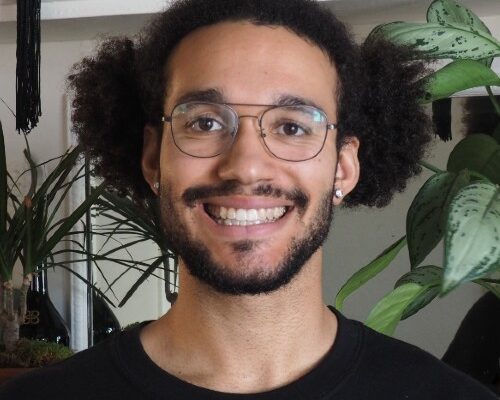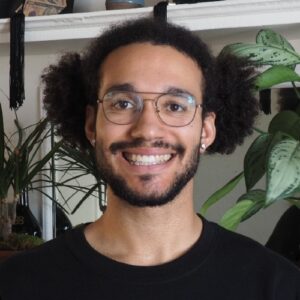
Lorenzo Washington: Sharing the Excitement of New Knowledge
April 2021
 Lorenzo Washington is a third year PhD candidate in the Plant and Microbial Biology Department, and has been involved with BASIS and Be A Scientist for the past 3 years. This spring Lorenzo was selected as an Inspiration Honoree as part of the 200,000 Students Inspired Celebration in May 2021.
Lorenzo Washington is a third year PhD candidate in the Plant and Microbial Biology Department, and has been involved with BASIS and Be A Scientist for the past 3 years. This spring Lorenzo was selected as an Inspiration Honoree as part of the 200,000 Students Inspired Celebration in May 2021.
What or who inspired you to study Plant and Microbial Science?
I’ve always been a science kid, always been the one that asked why. I got to college and started to get into research in the Plant Pathology department, initially thinking I was going to go into animal sciences and do research with animals–and then I found out plants were way cooler!
I’m a big advocate of the phrase it takes a village. It really took a village of people to support me in my interests, from my parents, grandparents and wider family were really supportive of my annoying inquiries, they would try to answer my questions every time I asked. They would take me to science museums nearby or a massive science fair on campus at UT Austin. As I got older in high school, I had a biology teacher that would discuss biological stuff with me. My senior year I didn’t have a first period and I would come to her class and help her teach the freshman. So, before going to college, my parents were instrumental and I had supportive teachers as well.
Once I got to college, the professors and grad students I was working with gave me space to work in the lab, and to get comfortable and understand what doing research actually looked like. Doctor Scholtoff was super instrumental, she gave me an independent project to work on, and pushed me into the early stages of what being a grad student can be like. She lowered the barrier of entry as somebody who’s a first generation student.
Who do you hope to inspire through your work?
I think as long as I can get somebody interested in science, I think I’ve done my job. I grew up in a rural community and the sciences in general do not have a lot of prominent faces of people of color, especially black people. I hope I can be one of those faces for younger students and show them you can be in this space and you can be yourself in this space. That’s what I hope to accomplish with the outreach work I do.
What continues to bring you a sense of wonder in your outreach work and/or research?
I work in a frustrating space with multiple organisms. I study how plants and microbes interact in a beneficial sense to help each other grow, which is frustrating but really exciting. When I look at a fungus that grows into the roots of plants to help it grow, I’m seeing how it grows to the roots, or I’m counting bacteria that give the plant nitrogen. It’s fun to think about the exciting ways that completely different forms of life accomplish the same thing. I physically get to see what happens at a microscopic scale. It’s like we’re putting together puzzle pieces at the edge of our understanding
When I’m working with students, I feel bright eyed and bushy tailed when it comes to science so I try to bring that when talking to students. When I was a kid I remember how excited I would get about learning about clouds or the weather. I’m usually discussing plants in BASIS lessons so I bring that for sure with Be A Scientist I keep it general but still try to bring in excitement. My favorite part is the kind of questions they ask and the kind of thinking they have going on. In an academic space you’re surrounded by people that are supposed to know this, but then a 5th grader might ask cooler questions than you heard at the seminar this week. It’s cool to see how intuitive students are when you interact with them and put in the effort to be engaging instead of a lecture. That gives me the most wonder: seeing how smart people are. That grounds how I approach teaching. I want to spark that and share that wonder of science, the excitement you get when you learn about new stuff and you think about how you can use that new knowledge. That’s the core of my science work, I want to share the process itself.
Describe a discovery you’ve made.
With Be a Scientist, at first [the students] were hard to focus. “What do you want your science project to be?” and they had fantastical ideas or didn’t know. After some discussion, they got into archery and wanted to do a physics lesson changing the weight of the arrow and seeing how far it went into things. It was cool to see in a week they went from being scattered to thinking “How can we make this safe to do this?” “How can we get the arrow weighted more?” They’re not gonna remember the specifics of what I taught them, but I think they will remember how exciting and how fun it was to think through this from a cool thought to “Here’s what I got.”
Describe a goal you have.
The stereotypical PhD answer: I would like to finish this PhD well. The last few months I’ve been in the lab thinking about my research question and jumping over all the hurdles. A new method got put out for quantifying this relationship I study where this fungus grows into plant roots [with] machine learning. I’m trying to get that up and running in the lab so I can save myself a few hours every week with this new method.